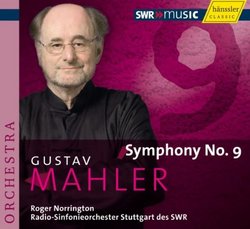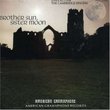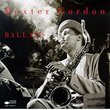| All Artists: Radio-Sinfonieorchester Stuttgart des SWR Title: Mahler: Symphony No. 9 in D Major Members Wishing: 0 Total Copies: 0 Label: Hanssler Classic Release Date: 4/27/2010 Genre: Classical Style: Symphonies Number of Discs: 1 SwapaCD Credits: 1 UPC: 4010276021988 |
Search - Radio-Sinfonieorchester Stuttgart des SWR :: Mahler: Symphony No. 9 in D Major
 | Radio-Sinfonieorchester Stuttgart des SWR Mahler: Symphony No. 9 in D Major Genre: Classical
|
Larger Image |
CD DetailsSimilarly Requested CDs
|
CD ReviewsOh good God Jeff Brown | Portland, OR | 04/30/2010 (1 out of 5 stars) "Just what the heck was Hanssler Classics thinking? Were they not there at the recording? Were they not listening to this prior to mass production? This is easily the worst Mahler 9 I have ever heard. This music is very difficult and Norrington does it no justice. There are an overwhelming number of examples of how this recording falls apart. [...] has an excellent essay on just how bad this recording is. I think the word they use is "awful" and I can't blame them. Even though the price is good, you should avoid this at all cost. Any recording by Bernstein, Abbado, or Karajan with whichever orchestra they conducted it with is better than this. Chailly, Tilson Thomas, Boulez, and Solti are all better than this. Use your hard-earned money elsewhere." An underdog Mahler Ninth that deserves its place Santa Fe Listener | Santa Fe, NM USA | 05/16/2010 (2 out of 5 stars) "I'm sympathetic with outsiders and contrarians, but only if they can produce results. I've avoided reviewing Roger Norrington's extensive discography. He made a point with his original period-style Beethoven cycle long ago, but his attempts to relive past glory haven't been successful. It's not his flawed argumentation -- I doubt that anyone of sense wants to be ear-bashed by musicologists about vibrato one more time. The failure is one of musicianship. Norrington is a mediocre time-beater, and when he has an idea it's applied externally. This sadly literalized Mahler Ninth demonstrates that you cannot save a sinking ship by sticking on Band-Aids. Strange tempos, abrupt, choppy phrasing, the "white" sound of stings without vibrato -- in the hands of a great conductor, none of these would be hindrances. In the hands of a mediocrity, they aren't salvation. Even the very fast pacing of the final Adagio has a precedent, as the four-star reviewer points out, in Bruno Walter's famous Vienna recording as the Nazis were closing in. If the metronome could turn Norrington into Bruno Walter, we'd be living in an age of miracles. In the first movement the eeriness and bare-bones quality of the first theme is actually enhanced by leaving off the vibrato; more conductors should try it. But as son as we reach the first buildup of sound, the orchestra sounds scrawny and under-motivated. Second-rate orchestras are capable of rising to the occasion; Norrington seems to be keeping his orchestra down. Ensemble is scrappy, balances haphazard. This level of execution is a throwback to the bad old days of Mahler in the early fifties when it was nearly impossible to find a performance that got all the notes right. compared to the first movement's demands, the Scherzo is easy, but it contains many shifts of mood and texture. A wealth of possibilities exist, and as one listens to the great conductors, this music succeeds with dozens of different emphases. Norrington cuts the Gordian knot by setting a tempo an heading straight ahead, as if no possibilities exist other than reaching the finish line before the clock strikes. It's superficial and insulting to Mahler's genius. The orchestral playing is neither here or there. In the Rondo-Burleske, one cannot plausibly say, as the four-star reviewer does, that the ensemble falls apart "a bit," or that the Berlin Phil. under Bernstein is far worse. Norrington's hectic tempo and choppy phrasing are too much for his musicians. A better orchestra would have accomplished more -- the pacing isn't "insane," as the same reviewer claims. Here, everyone is scrambling, and therefore no nuance is possible. Even the basic markings of loud and soft are largely ignored as the dynamic hovers around mezzo forte. At 19 min., Norrington's Adagio is an eye-opener compared to, say, James Levine's thirty minutes plus from Munich. The zinging strings and chirpy mood don't convince me, but then, I want to feel something. If you are satisfied with a robotic run through, well and good. That's the only reason I can imagine for approving of this travesty." Insane or ingenious? Or both? L. Johan Modée | Earth | 06/24/2010 (5 out of 5 stars) "Roger Norrington's Mahler cycle for Hänssler Classics (their second cycle, following Michael Gielen's generally excellent cycle: Gielen Conducts Mahler Symphonies 1-9) is probably the most hated and rejected project on record in many years. Norrington is famous for his revisionist or "historically informed" view on playing techniques, insisting, basically, that string vibrato is a recent development (post WW 2) that distorts older works (i.e., early modernist, late romantic works pre WW 2). Norrington is the principal conductor for Radio-Sinfonieorchesters Stuttgart since 1998, and he has made the orchestra famous for this non-vibrating "Stuttgart sound".
I must confess that I hated Norrington's period Beethoven interpretations, which he recorded for EMI some decades ago (see Symphonies 1-9 - I have not heard his second cycle for Hänssler). In those EMI performances he interpreted Beethoven's metronome markings literally, which resulted in extreme tempi in crucial passages, not always convincing. His literal readings were also quite boring and uninspiring in general. Thus I had serious doubts concerning Norrington's evolution from a quite boring British classic authenticist to an historically informed "Kapellmeister" in Stuttgart. With too many bad Mahler interpretations in my collection already, I hesitated investing in this new cycle. But this is not one of those bad interpretations! On the contrary I find it convincing, stimulating, well played and well recorded (it's a "live" recording, but the Stuttgart audience is not audible). It is an exaggerated interpretation, of course, but Mahler's works calls for exaggerations, as Bernstein once claimed. One could, for instance, compare Kubelik and Bernstein! So much for the insanity issue. The most demanding exaggeration in this interpretation is not the almost complete absense of string vibrato, which is some sort of hype as far as I can tell, but the swift take of the final movement. It is comparable to Walter's famous 1938 recording, Symphony No 9, the obvious reference which Norrington himself also indicates. Walter has 18:10, Norrington 19:23. Is it too fast? Not in my view. Some conductors have favoured extremely slow tempi for this movement in particular, but also for the "Adagietto" in the fifth (e.g., von Karajan, Bernstein, Sinopoli). That kind of exaggeration distorts the music, killing the flow. By contrast, Norrington's swift approach is refreshing and quite ingenious. Radio-Sinfonieorchesters Stuttgart is not one of the great German orchestras but nonetheless excellent, playing with confidence and brio, apparently appreciating Norrington's regime. The playing does not "fall apart" anywhere, as it actually did in Günther Herbig's recording of the same work some years ago: Symphony 9. In sum, yes, five stars for a very interesting, insane and ingenious interpretation in fine sound. So this is not a "stupid" interpretation that should be avoided. On the contrary, Norrington's Mahler ninth is an emotionally raw and compelling performance that divides critics and music lovers stuck in different camps. It will offend those who assume that the "definitive" Mahler interpretations came with Bernstein and von Karajan. In addition to its artistic merits, I take that as one of its significant qualities. I will return to this recording many times." |

 Track Listings (4) - Disc #1
Track Listings (4) - Disc #1







![Across The Universe [Deluxe Edition]](https://nationalbookswap.com/cd//m/51/1251/1241251.jpg)
